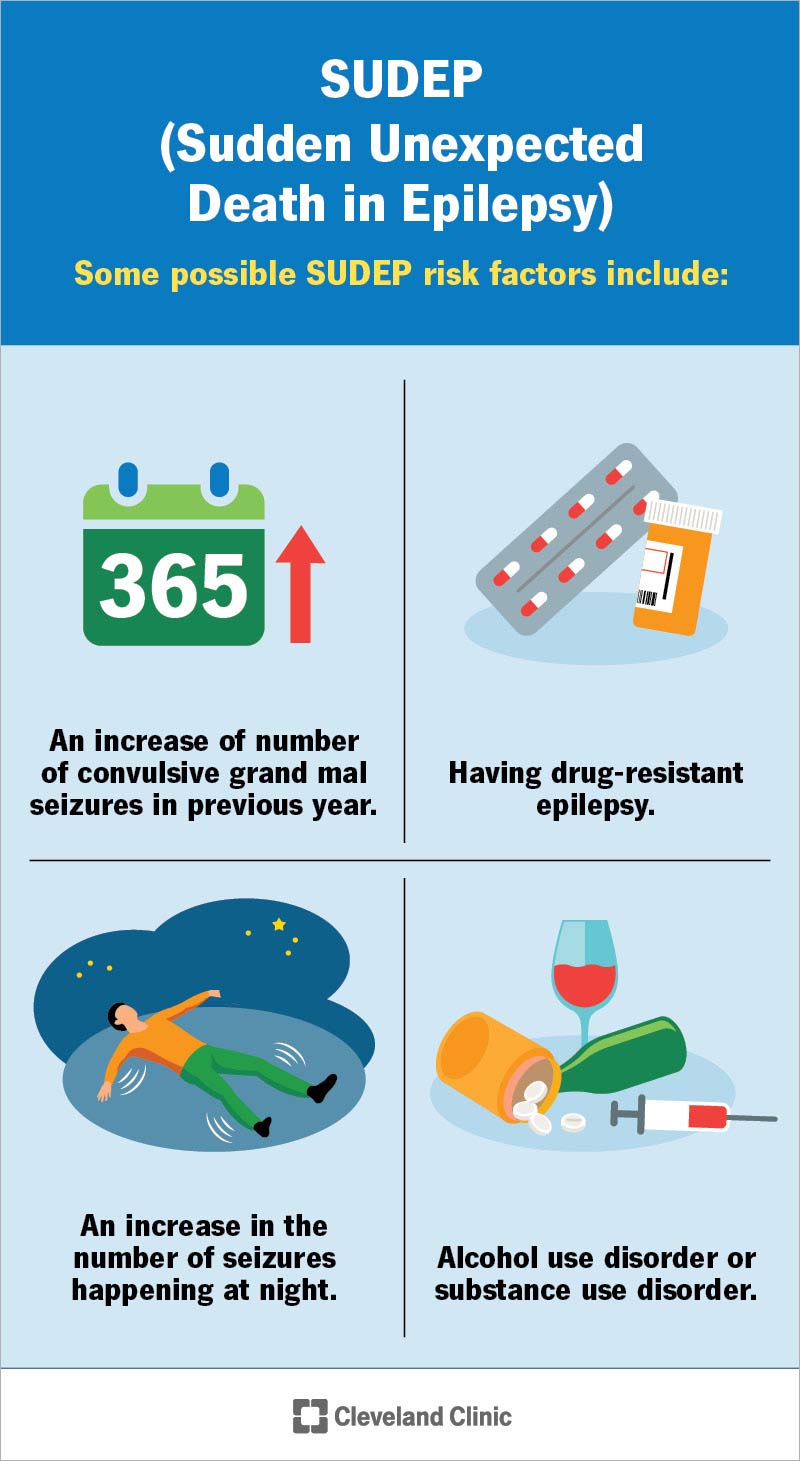SUDEP stands for “sudden unexpected death in epilepsy.” SUDEP happens when a person with epilepsy who was otherwise healthy, unexpectedly dies, and no cause can be determined. Researchers don’t know why SUDEP happens, but they have a few theories, including issues with breathing, heart rhythm and brain function. There are ways to reduce your risk.
Advertisement
Cleveland Clinic is a non-profit academic medical center. Advertising on our site helps support our mission. We do not endorse non-Cleveland Clinic products or services. Policy
SUDEP stands for “sudden unexpected death in epilepsy.” It describes the unexpected death of a person with epilepsy who was otherwise in good health. Injury, drowning or other known causes didn’t lead to the death in this situation. Rather, no other cause of death is found if an autopsy is performed.
Advertisement
Cleveland Clinic is a non-profit academic medical center. Advertising on our site helps support our mission. We do not endorse non-Cleveland Clinic products or services. Policy
SUDEP is the leading cause of death in people with uncontrolled seizures.
In more than one-third of SUDEP cases, there were signs of a seizure close to the time of death. The person is often found lying face down in bed, but the cause of death is unknown. Some researchers believe a seizure — which causes SUDEP — may affect either the cardiac (heart) or respiratory (lung) centers in the brain.
SUDEP is a scary thing to think about. It’s rare, but it does happen. If you or a loved one has epilepsy, be sure to talk to your healthcare provider about your risk of this condition.

Image content: This image is available to view online.
View image online (https://my.clevelandclinic.org/-/scassets/images/org/health/articles/sudep)
Researchers don’t know exactly what causes SUDEP, but there are many theories. The condition happens most often at night or during sleep when no one witnesses the death. That leaves many questions and few answers. There’s sometimes evidence that a person had a seizure before dying. But that’s not always the case.
Possible causes of SUDEP include issues with breathing, heart rhythm and brain function that occur with a seizure:
Advertisement
SUDEP may happen due to more than one reason. It may happen from a combination of breathing issues, abnormal heart rhythm and brain function changes. It could also result from other factors that scientists haven’t discovered yet.
The risk for SUDEP in adults and children with epilepsy is small. Researchers don’t know why the condition happens. Experts have tried to come up with a list of possible risk factors that may increase your chance of SUDEP. If you or your loved one has epilepsy and you’ve had any of the following recently, make sure to talk to your healthcare provider about your risk.
The greatest risk factor for SUDEP is having generalized convulsive seizures, especially at night. These are also called tonic-clonic or grand mal seizures.
Other risk factors include:
The definition of SUDEP is the sudden and unexpected death of a person with epilepsy for which no apparent alternative cause has been found. So, to make a diagnosis of SUDEP, other possible causes of death need to be ruled out.
The diagnosis is based on a person’s history and examination findings after their death.
SUDEP is one of the most feared complications of epilepsy. So, managing your risk is vital. If you have epilepsy, it’s important to discuss your specific risk factors for SUDEP with your healthcare provider. Ways to reduce your risk include:
If you have any type of epilepsy, you should see your healthcare provider regularly. This is especially true if you have unmanaged seizures. Talk to your provider about ways to manage your seizures and lower your risk of SUDEP.
The best way to prevent SUDEP is by managing your seizures. You can do this by:
Advertisement
If your loved one passed away from SUDEP (sudden unexpected death in epilepsy), the loss can be devastating. Not knowing what happened can make this time confusing and tragic. Know that you’re not alone. There are support groups available for you and your family to help you process your grief. Talk to a healthcare provider about finding a resource for you.
Advertisement

Sign up for our Health Essentials emails for expert guidance on nutrition, fitness, sleep, skin care and more.
Learn more about the Health Library and our editorial process.
Cleveland Clinic’s health articles are based on evidence-backed information and review by medical professionals to ensure accuracy, reliability and up-to-date clinical standards.
Cleveland Clinic’s health articles are based on evidence-backed information and review by medical professionals to ensure accuracy, reliability and up-to-date clinical standards.
Epilepsy and seizures can impact your life in challenging ways. Cleveland Clinic experts can help you manage them and find relief.
